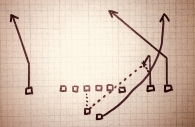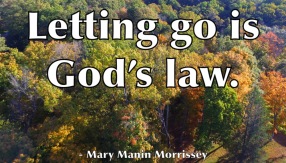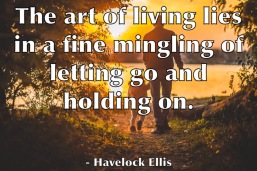Are you exhausted from worrying about someone? Weighed down from constantly carrying them in your heart?
Okay, friends. Huddle up.
One of my favorite football plays is the ol’ Hook-and-Ladder. To pull it off requires some impeccable timing, skill, and trust … but this one play can change the entire game.
For the non-football fan, here’s the gist: The receiver goes out for a pass and cuts back just as the quarterback delivers a perfect strike. As the defense closes in, the man with the ball pitches it to a teammate streaking toward him. Sometimes the receiver makes a rushed, wild toss. Sometimes he holds the ball too long and gets clobbered. In either case, it’s usually a fumble recovered by the other team. When executed well, however, the defense fails to account for that unseen teammate who collects the toss in stride toward the end zone.
The ol’ Hook-and-Ladder.
That, friends, is exactly the way we should care for others. With loving skill, faith, and timing, we collect them into our arms, and know precisely when to release them.
 I recently heard from a young lady who (though battling her own demons) has invested herself emotionally, mentally, and spiritually in caring for a morose, problematic friend. In short, the relationship is killing her.
I recently heard from a young lady who (though battling her own demons) has invested herself emotionally, mentally, and spiritually in caring for a morose, problematic friend. In short, the relationship is killing her.
She reached out to me because of some warped sense of guilt for what she’s feeling: drained, used, and unappreciated by someone who is incapable of reciprocating the same love. Meanwhile, this poor gal suffocates her own heartaches while trying to carry her friend.
This never ends well.
 My mind immediately drew up the ol’ Hook-and-Ladder, so I tossed her the grace to do the kindest thing possible:
My mind immediately drew up the ol’ Hook-and-Ladder, so I tossed her the grace to do the kindest thing possible:
“I’m so sorry,” I replied. “You are completely justified in what you’re feeling. You have loved your friend well. Now release her to God.”
She later realized how that simple, yet profound act afforded her own neglected soul some much needed space to breathe.
I understand. I’ve been there.
Friends, I confess: I fail to live out my faith in countless ways. However, one of my greatest sins has been my vain attempt to claim responsibility for another person’s well-being, that I must become someone’s hero and savior, and that it’s completely up to me to deliver some kind of happy ending for another human being.
It’s an easy trap for an empathetic heart to fall into, but it’s corrupt and cruel to everyone involved.
First of all, this faithless compulsion tricks you into embracing this lie: “God can’t help, so it’s up to me.” I don’t have to spell out how sinful that is, riddled with ugly pride and unbelief.
Second, it’s destructive. You simply don’t have the capacity to “fix” another person’s brokenness. To lower your head and keep charging into the fray will only leave you more bedraggled and worthless. And the one you’re trying to help? They often wind up crippled from your attempts … and whatever is good and healthy about your relationship always suffers the fallout of good intentions gone awry.
 Friends, you can’t self-mutilate your heart by holding yourself accountable for another person’s destiny. Love them, yes. But then release them. Don’t be that wide receiver caught holding onto the ball too long. The enemy will close fast and crush you. You’ll fumble what you’re trying to defend. You’ll be left in a mangled heap, praying for a stretcher to cart you off the field and no longer much good to anyone.
Friends, you can’t self-mutilate your heart by holding yourself accountable for another person’s destiny. Love them, yes. But then release them. Don’t be that wide receiver caught holding onto the ball too long. The enemy will close fast and crush you. You’ll fumble what you’re trying to defend. You’ll be left in a mangled heap, praying for a stretcher to cart you off the field and no longer much good to anyone.
My wife is a veterinarian. Her and her colleagues suffer the brutality of what’s called compassion fatigue—caring to the point of exhaustion and self-destruction. When you slip into this danger zone, your heart gets assaulted. Bitterness slithers in, and you begin to cannibalize your most precious gift—the ability to love.
Empathetic people often lose themselves by caring too much. They wind up feeling empty, with nothing left to give, and they start to feel trapped with an odd mix of self-loathing and some unrealistic desire to fix what’s broken. Among veterinarians, the suicide rate has reached grotesque proportions for this very reason.
Caring can easily be twisted into something ugly, sinful, and deadly.
 I’m not suggesting you stop caring for those who need you. Quite the opposite. I’m urging you to have a little more faith in God and a little less pride in your own ability to save the world.
I’m not suggesting you stop caring for those who need you. Quite the opposite. I’m urging you to have a little more faith in God and a little less pride in your own ability to save the world.
Yes, catch those who are falling and hold them in crisis.
Yes, protect them from the clawing arms of the enemy.
But be prepared to make the pitch to your teammate—release them to God. Do it with a prayerful declaration: “God, you know my heart for ____, so I now release them into your hands.” This is akin to what some might call breaking soul ties, in which you sever unhealthy spiritual links that hold your heart in bondage.
 Allowing yourself this incredible kindness will free your heart to love and care in new, far-reaching ways.
Allowing yourself this incredible kindness will free your heart to love and care in new, far-reaching ways.
Yes, you are your brother’s keeper, but also consider Jesus’ interaction with the rich young ruler (from Matthew, Mark, and Luke): A desperate, broken man comes in search of life. Jesus offers him compassion and truth, but the young man rejects the proposal and goes away sad. Jesus, however, doesn’t go chasing after the man. Instead, I suspect Jesus said a silent prayer from the fullness of his loving heart: “Father, I release him into your care. Please go with him. Don’t give up on him.” With that, Jesus is free to continue on his life’s mission.
Jesus perfected the ol’ Hook-and-Ladder.
If you practice that same kind of timing and trust, God will show up right on cue to gather your toss into his arms. Have a little faith in Him to carry the rock downfield.
Who’s weighing heavy on your heart right now?
Catch them. Then release them.
The ol’ Hook-and-Ladder.
It’s a great play.
Be well, friends.
Please share this. Many loving people are suffering under the weight of their own compassion.
This might also be helpful: Soul Care

I enjoyed the analogy. This is spot-on with what I’ve gotten from Al-Anon. In addition to your points, the person you’re trying to help deserves the dignity to make choices, do for themselves, or ask for the help they need.
Where I struggle with the “letting go” and releasing to God is with my kids. They’re all under 18, and each is battling demons of one sort or another. Releasing them in the same way I would my spouse or mother or close friend would feel like negligent parenting. This is something I’ve tossed around and talked about a lot, and haven’t yet landed on a comfortable solution.
Thanks for the post.
LikeLiked by 1 person
Thanks for sharing that. Indeed, that balance between holding on and letting go is a tightrope walk when it comes to our kids; no simple answer there (I’m shopping an entire manuscript on that very subject–want to buy it? 🙂 ). For me, honing my practice of listening prayer has become a major component of my faith journey. These days, instead of asking for a particular deliverance, I try to ask God what he’s already doing in my kids’ lives and then get on board with that. What I’ve come to realize is this: many times I’d been working toward a certain outcome for my kids while God was arranging something entirely different. I’ve had many sleepless nights worrying about my kids’ “problems”, but the very thing I was praying against turned out to be some sort of greater protection or even a preparation for a blessing yet to come. So, in a messy nutshell, “letting go” when it comes to my kids is releasing my own expectations and desires and becoming more attuned to the ways God is already working in the lives of my kids. That’s never easy for those of us who tend to be control freaks.
Again, thanks for reading and commenting! Blessings, friend.
LikeLike
Reblogged this on Tell my story. and commented:
As I read this wonderful and insightful post, I thought of Emmett and those close to him, who probably tried to save him from himself.
I thought of Jennie Kehoe, and Emmett’s sister, Katie Meade, who probably felt the weight of their compassion as impossibly heavy at times.
LikeLiked by 1 person
I’m intrigued by your story. Too often we forget that so many who came before us wrestled with the same demons we face today.
LikeLike
As I’ve spent the past five years studying my cousin’s struggle with alcoholism, I’m reminded of two things: First, the deep gratitude I have for AA and my program today. It didn’t exist when my cousin Emmett was alive, and it is easy for us in these ‘modern’ times to look back and pity those 100 years ago who struggle with it. Fact is, they did the best they could with the knowledge/science/understanding they had at the time. It wasn’t great, and we’ve certainly come a long way since then, but I can’t ‘look down’ on their efforts, because the disease of alcoholism today is just as mysterious as it was then.
Second, when Bill W said that this disease was a FAMILY disease, he wasn’t kidding. I see how Emmett’s family and friends struggled mightily to help him, using the resources they had at hand (which weren’t much, and often just as intoxicating/damaging as booze). Alcoholism was also considered a moral/psychological failing, incumbent upon the individual to help himself or herself. Psychiatry? It wasn’t considered. Psychiatrists in 1912 were still called “alienists”, and were looked upon with fear/suspicion (and still are to some extent today!). When Emmett’s family and friends ran out of options at hand, they gave up on him. They had to take care of themselves, and their own sanity too. And honestly, I don’t blame them.
It was a sad, hopeless situation all the way around.
LikeLike
Excellent, Bert. I’m glad you brought in an example from Jesus’ life. Many of us empathizers don’t know how to draw healthy lines, and when we do, we feel guilty. If you’re familiar with the enneagram, I’m targeted squarely by what you say, as a person in both the “4” space and the “2” space! To love someone AND release them to God… and their choices… truly is about love. To not release and then feel guilty is about me. Blessings to you and Laura. Sylvia
Sent from my iPad
>
LikeLiked by 1 person
Thanks for that, Sylvia. So often empathetic people end up more wounded than the people they want to help rescue. “Guard your heat” is often my battle cry to the “troops” (and to myself!).
Much love, my friend!
LikeLike